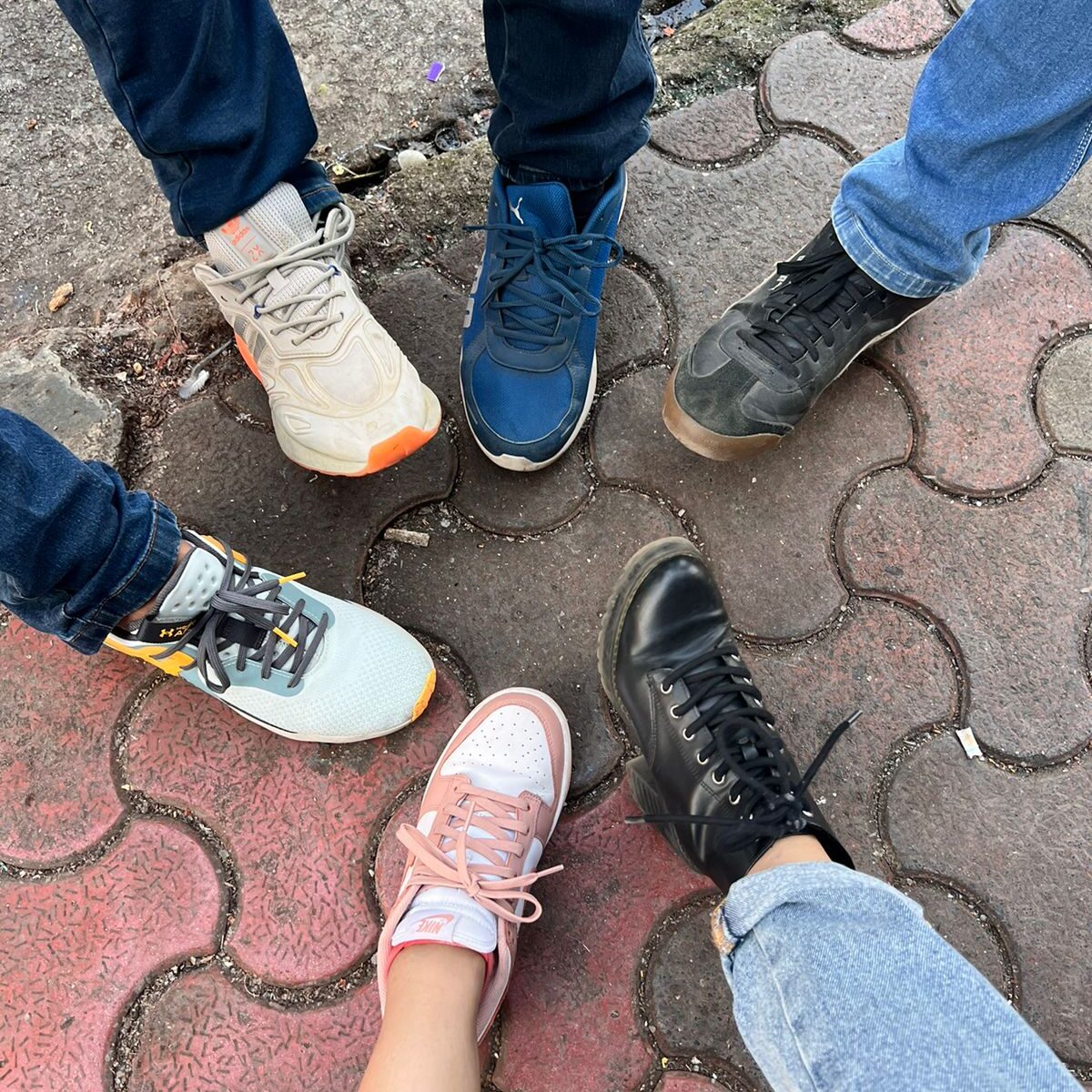What makes one a Friend?
A friend is someone who you have a positive and mutual relationship with. Friends can come from all walks of life and can be found in a variety of contexts, such as school, work, sports teams, or social clubs. A friend is someone who you enjoy spending time with, can confide in and rely on for support and encouragement, and who shares common interests and values with you.
Friends can come in many different forms and levels of intimacy, from casual acquaintances to best friends. A friend can be someone you’ve known for years, or someone you’ve just met. Friends can also be people you connect with through social media or other online platforms, although it’s important to be cautious about sharing personal information or building relationships that are entirely online.

Ultimately, the definition of a friend can vary from person to person and can depend on individual preferences and experiences. However, at its core, a friend is someone who you enjoy spending time with, who you trust and who supports you through the ups and downs of life.
Types of Friends?
There are many types of friends that people can have, and the characteristics of a friend can vary depending on the individual and the type of relationship they have. Here are some common types of friends:
- Best Friend: This is the person who knows you better than anyone else. They are the first person you call when you need advice, a shoulder to cry on, or someone to share a funny story with. They are loyal, trustworthy, and always have your back.
- Childhood Friend: This is someone who you have known since you were young. They may have been your neighbor, classmate, or family friend. Even if you don’t see them often, you have a shared history and bond that has stood the test of time.
- Work Friend: This is someone you met through your job or career. They may not be your closest confidante, but you share a common interest in your work and can offer each other professional advice and support.
- Activity Friend: This is someone who you met through a shared interest or hobby, such as playing sports, hiking, or playing an instrument. You may not have a deep personal connection, but you enjoy spending time together doing something you both enjoy.
- Casual Friend: This is someone you see occasionally, such as a neighbor or acquaintance. You may not know them well, but you are friendly and enjoy chatting with them when you cross paths.
- Long-Distance Friend: This is someone who lives far away, but you maintain a strong connection through phone calls, texts, or video chats. You may not see each other often, but you share a strong bond that distance can’t diminish.
- New Friend: This is someone who you recently met and are still getting to know. They may become a close friend over time, but for now, you are still in the process of building a relationship.
- Roommate Friend: This is someone you live with, and who you may have initially met through a housing website or a mutual friend. This person is often someone you spend a lot of time with, and who may have shared experiences and habits. Roommate friends can be great sources of support and companionship, but it’s important to navigate boundaries and communication in shared living spaces.
- Mentor or Advisor: This is someone who you look up to and respect, and who may offer guidance or support in your personal or professional life. Mentors can be a great source of wisdom and perspective, and can help you navigate new challenges or decisions.
- Virtual Friend: This is someone who you have met online through social media, forums, or gaming communities. Virtual friends can be great sources of connection and support, but it’s important to be cautious about sharing personal information or building relationships that are entirely online.
- Group Friend: This is someone who you know through a larger group or social circle. These friends may be more casual or surface-level relationships, but can still provide a sense of community and belonging.
- Travel Friend: This is someone who you have met while traveling, and who you may have shared a meaningful experience with. Travel friends can be a great source of adventure and spontaneity, but it’s important to navigate communication and expectations around what your friendship looks like outside of the context of travel.
- Childhood Enemy Turned Friend: This is someone who you may have initially disliked or even fought with when you were younger, but who you have since made amends with and built a positive relationship with.
- Fair-Weather Friend: This is someone who is only present in your life during good times or when things are going well, and may not be there to support you through challenges or difficult situations.
Overall, there are countless types of friends that we can have in our lives, each with their own unique characteristics and dynamics. The most important thing is to cultivate relationships that are positive, supportive, and authentic.

What personalities to look for in people to identify reliable friends?
Identifying reliable friends can be a challenge, but there are some personality traits and characteristics to look for that can help you build strong, positive relationships. Here are a few key qualities to look for in reliable friends:
- Trustworthiness: This is perhaps the most important quality to look for in a friend. You want to know that you can rely on them to keep your secrets, follow through on commitments, and be there for you when you need them.
- Empathy: A reliable friend should be able to put themselves in your shoes and understand your perspective. They should be able to offer support and encouragement when you are going through a tough time.
- Honesty: Honesty is key in any relationship, and a reliable friend should be someone who tells you the truth, even if it’s difficult to hear. They should also be honest with themselves and with you about their own thoughts, feelings, and motivations.
- Reliability: A reliable friend should be someone who follows through on their commitments and is there for you when you need them. They should be dependable and consistent, and you should be able to count on them.
- Open-mindedness: A reliable friend should be open-minded and accepting of different perspectives and lifestyles. They should be non-judgmental and supportive, even if they don’t always agree with your choices.
- Good communication skills: A reliable friend should be able to communicate effectively and openly with you. They should be able to listen to your concerns and offer feedback in a constructive and non-judgmental way.
- Positivity: A reliable friend should be someone who brings positivity and optimism into your life. They should be able to offer support and encouragement when you need it, and celebrate your successes with you.
Ultimately, identifying reliable friends is about finding people who share your values, communicate effectively, and are willing to support you through thick and thin. It takes time and effort to build strong friendships, but with the right people, it can be one of the most rewarding and fulfilling aspects of life.
“You can make more friends in two months by becoming interested in other people than you can in two years by trying to get other people interested in you.”
Dale Carnegie
Friend Circles and Balance
Friend circles refer to the group of friends that you have in your life. Friend circles can vary in size and can include different levels of intimacy and frequency of interaction. Maintaining balance within your friend circle is important because it can help you to avoid feelings of burnout or neglect in your relationships, and can help you to build stronger and more meaningful connections with the people you care about. Here are a few tips for maintaining balance within your friend circle:
- Prioritize quality over quantity: It’s better to have a few close friends who you can rely on and who support you, rather than a large number of acquaintances who you may not have a deep connection with. Prioritizing quality friendships can help you to maintain balance by focusing your energy on the relationships that matter most.
- Be intentional with your time: It can be easy to get caught up in the busyness of life and let your friendships fall by the wayside. To maintain balance, it’s important to be intentional with your time and to make an effort to connect with the people in your life on a regular basis. This could mean scheduling regular hangouts or phone calls, or simply taking the time to check in with your friends and see how they’re doing.
- Respect boundaries: Each of your friends may have different needs and boundaries when it comes to their time and energy. To maintain balance, it’s important to respect these boundaries and to avoid overwhelming your friends with too many demands or expectations.
- Be open and honest: Communication is key in any relationship, and being open and honest with your friends can help you to maintain balance and avoid misunderstandings. If you’re feeling overwhelmed or neglected in your friendships, it’s important to speak up and express your needs in a constructive and non-judgmental way.
- Practice self-care: Taking care of your own physical and mental health is essential for maintaining balance in all areas of your life, including your friendships. Make sure to take time for yourself to recharge and prioritize your own needs, so that you can show up as your best self in your relationships.
By prioritizing quality friendships, being intentional with your time, respecting boundaries, communicating openly and honestly, and practicing self-care, you can maintain balance within your friend circle and build strong, supportive relationships that last a lifetime.

Identifying a Toxic Friendship
Identifying whether you are in a toxic friendship can be difficult, as it can sometimes be hard to recognize negative patterns or behaviors when you are close to someone. However, there are several signs that can indicate you may be in a toxic friendship, including:
- Consistently feeling drained or unhappy after spending time with your friend.
- Feeling like you have to constantly walk on eggshells around your friend or change who you are to please them.
- Your friend consistently puts you down, belittles you or criticizes you.
- Your friend constantly interrupts you, talks over you or dominates conversations.
- You feel like you have to constantly defend yourself or your actions to your friend.
- Your friend consistently makes you feel guilty or manipulates you into doing things you don’t want to do.
- Your friend consistently crosses your boundaries, even after you’ve communicated them clearly.
- You feel like you can’t trust your friend or that they don’t have your best interests at heart.
- Your friend is unsupportive of your goals and ambitions, or tries to hold you back in some way.
- Your friend consistently gossips or spreads rumors about you or other people.
If you are experiencing any of these signs, it may be an indication that you are in a toxic friendship. It’s important to recognize these patterns and to take steps to protect your own well-being. This may involve setting boundaries, having an honest conversation with your friend about how you feel, or even ending the friendship if it’s no longer serving you. Remember that it’s okay to prioritize your own needs and to seek out healthy, positive relationships that support your growth and well-being.

